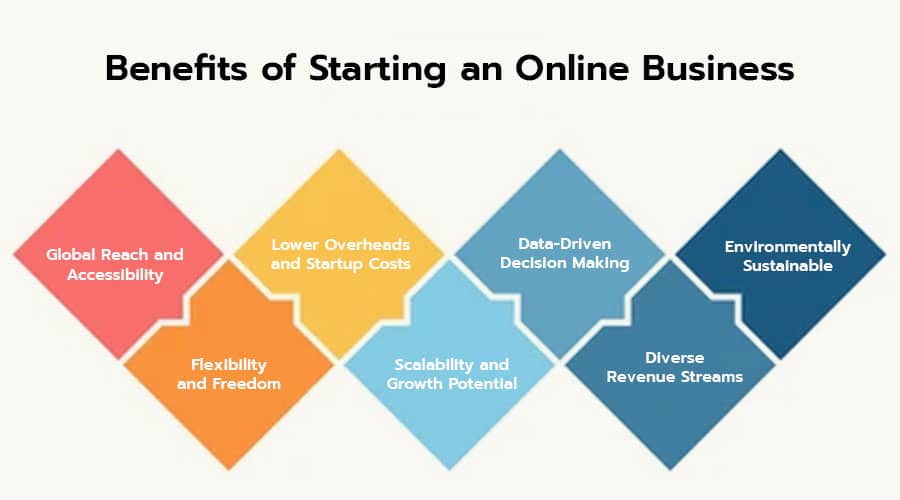Table of Contents
What is Innovative Online Business
In today’s ever-evolving digital realm, the concept of innovative online business has become more than just a trend; it’s a cornerstone of modern entrepreneurship. With the world interconnected through the vast web of the internet, businesses are continually seeking novel ways to stand out, thrive, and redefine traditional models. But what exactly constitutes innovative online business, and how does it shape the entrepreneurial landscape?
At its core, innovative online business refers to the utilization of cutting-edge technologies, creative strategies, and forward-thinking approaches to establish and grow enterprises in the virtual sphere. It encompasses a wide array of practices, from disruptive business models and revolutionary products/services to inventive marketing techniques and customer engagement initiatives.
One of the defining characteristics of innovative online businesses is their ability to leverage emerging technologies to address evolving consumer needs and market demands. Whether it’s artificial intelligence, blockchain, virtual reality, or the Internet of Things, these businesses harness the power of technology to streamline operations, enhance user experiences, and drive unprecedented growth.
Moreover, innovative online businesses are not confined by geographical boundaries. Through e-commerce platforms, digital marketplaces, and online storefronts, they can reach a global audience with minimal overhead costs. This borderless nature not only expands market reach but also fosters diversity, creativity, and collaboration on a global scale.
Furthermore, agility and adaptability are fundamental traits of innovative online businesses. In the fast-paced digital landscape, these enterprises must constantly evolve, iterate, and pivot in response to market dynamics, technological advancements, and shifting consumer behaviors. By embracing change and experimentation, they remain at the forefront of innovation and maintain a competitive edge in crowded marketplaces.
Additionally, customer-centricity lies at the heart of successful innovative online businesses. By leveraging data analytics, personalized marketing strategies, and responsive customer support systems, these enterprises cultivate strong relationships with their audience, driving loyalty, retention, and advocacy.
Innovation in online business also extends beyond products and services to encompass business models and revenue streams. Subscription-based models, peer-to-peer marketplaces, and platform-as-a-service offerings are just a few examples of innovative approaches that challenge traditional paradigms and revolutionize industries.
Easy To Start 95 Online Business Ideas

Are you itching to embark on an entrepreneurial journey but unsure where to start? In today’s digital age, the online world offers a plethora of opportunities for aspiring business owners. Whether you’re looking to escape the 9-to-5 grind, supplement your income, or pursue a passion, there’s never been a better time to launch an online business.
Here are 95 online business ideas to inspire and guide you towards your entrepreneurial goals:
- E-commerce Store: Sell products online through platforms like Shopify, Etsy, or Amazon.
- Dropshipping: Partner with suppliers to sell their products without holding inventory.
- Print-on-Demand: Design and sell custom merchandise like t-shirts, mugs, and phone cases.
- Handmade Crafts: Create and sell handmade goods such as jewelry, candles, or artwork.
- Digital Products: Develop and sell digital goods like e-books, courses, or graphics.
- Subscription Box Service: Curate and deliver themed boxes of products to subscribers each month.
- Freelance Services: Offer your skills as a freelancer in areas like writing, graphic design, or programming.
- Virtual Assistant: Provide administrative support to businesses remotely.
- Social Media Management: Manage social media accounts for businesses to increase their online presence.
- Blogging: Start a blog and monetize it through advertising, sponsored content, or affiliate marketing.
- Affiliate Marketing: Promote products or services and earn a commission for each sale made through your referral.
- Podcasting: Host a podcast on a topic you’re passionate about and monetize through sponsorships or listener support.
- YouTube Channel: Create videos on a niche topic and earn money through ads and sponsorships.
- Online Coaching: Offer coaching services in areas like fitness, nutrition, or personal development.
- Online Courses: Develop and sell courses on subjects you’re knowledgeable about.
- Language Tutoring: Teach languages online to students around the world.
- Online Fitness Training: Provide personalized fitness training and coaching through virtual sessions.
- Nutrition Consulting: Offer nutrition advice and meal plans to clients online.
- Remote Counseling: Provide therapy or counseling services through video calls.
- Virtual Event Planning: Plan and coordinate virtual events such as webinars, conferences, or workshops.
- Online Travel Agency: Assist travelers with booking flights, accommodations, and activities online.
- Digital Marketing Agency: Provide marketing services such as SEO, PPC, and content creation to businesses.
- Web Development: Design and develop websites for individuals or businesses.
- App Development: Create mobile applications for various purposes.
- Online Advertising: Manage advertising campaigns for businesses on platforms like Google Ads or Facebook Ads.
- SEO Consulting: Help businesses improve their search engine rankings and online visibility.
- Email Marketing Services: Manage email marketing campaigns for businesses to engage with their audience.
- Content Writing Services: Offer writing services for blogs, websites, or marketing materials.
- Graphic Design: Create logos, branding materials, and graphics for businesses.
- Virtual Interior Design: Provide interior design services remotely through digital consultations.
Get Started With Affiliate Marketing/Referral Marketing
In today’s digital age, there’s a myriad of opportunities to make money online, and one of the most popular and accessible methods is through affiliate marketing. If you’re looking to dive into the world of online entrepreneurship and generate passive income, affiliate marketing could be your golden ticket. But what exactly is affiliate marketing, and how can you get started? Let’s delve into the basics and explore how you can kickstart your journey into the lucrative realm of affiliate marketing.
What is Affiliate Marketing?
Affiliate marketing is a performance-based marketing strategy where individuals (affiliates) earn commissions by promoting products or services of other companies. It’s a symbiotic relationship between the affiliate, the merchant (the company selling the product), and the consumer. Affiliates earn a commission for every sale, lead, or action generated through their promotional efforts.
How Does Affiliate Marketing Work?
The process of affiliate marketing is straightforward:
- Choose Your Niche: Select a niche or industry that aligns with your interests, expertise, and target audience. It could be anything from fitness and wellness to technology or personal finance.
- Find Affiliate Programs: Once you’ve identified your niche, research and join reputable affiliate programs relevant to your chosen niche. Many companies offer affiliate programs, including Amazon, ClickBank, ShareASale, and Commission Junction.
- Select Products to Promote: Browse through the available products or services within your chosen affiliate programs and select those that resonate with your audience and offer genuine value.
- Create Content: Develop high-quality content such as blog posts, videos, reviews, or social media posts that promote the products or services you’ve chosen. Your content should be informative, engaging, and persuasive, driving your audience to take action.
- Share Your Affiliate Links: Embed your unique affiliate links within your content. These links contain tracking codes that monitor the traffic and sales generated through your promotional efforts.
- Drive Traffic: Utilize various marketing channels such as your website, social media platforms, email lists, or YouTube channel to drive traffic to your content and affiliate links.
- Earn Commissions: As your audience clicks on your affiliate links and makes a purchase or completes a desired action, you earn a commission, which is credited to your affiliate account.
Tips for Success in Affiliate Marketing:
- Build Trust: Establish credibility and trust with your audience by providing valuable and honest recommendations. Avoid promoting products solely for the sake of earning commissions.
- Focus on Quality Content: Create content that educates, entertains, or solves a problem for your audience. Quality content not only attracts more visitors but also enhances your authority in your niche.
- Diversify Your Revenue Streams: Don’t rely solely on one affiliate program or product. Diversify your offerings to mitigate risks and maximize your earning potential.
- Track Your Performance: Monitor and analyze the performance of your affiliate campaigns. Identify what strategies are working well and optimize or pivot where necessary.
- Stay Updated: The digital landscape is constantly evolving, so stay informed about industry trends, new products, and changes in affiliate programs to adapt your strategies accordingly.
How Do Freelance Services Work?

In the evolving landscape of modern work, freelancing has emerged as a prominent avenue for both professionals seeking flexibility and businesses looking for specialized skills. But how exactly do freelance services work, and what sets them apart from traditional employment models? Let’s delve into the mechanics of freelance services to understand this dynamic ecosystem better.
What are Freelance Services?
Freelance services refer to work arrangements where individuals offer their expertise to clients or businesses on a project-by-project basis, often remotely. Unlike full-time employment, freelancers are not bound by long-term contracts and enjoy the freedom to choose their projects, clients, and working hours.
How Does it Work?
1. Finding Clients:
Freelancers typically find clients through various channels such as online freelance platforms like Upwork, Fiverr, or through networking, referrals, and social media. Building a strong portfolio and establishing a reputable online presence are crucial for attracting clients.
2. Negotiating Terms:
Once a client expresses interest, freelancers negotiate project details including scope, timelines, deliverables, and pricing. Clear communication and setting expectations upfront are vital to avoid misunderstandings later on.
3. Executing the Project:
With terms agreed upon, freelancers commence work on the project. They leverage their skills and expertise to deliver high-quality results within the specified timeframe. Communication with the client throughout the project ensures alignment and allows for any necessary adjustments.
4. Submitting Deliverables:
Upon completing the project, freelancers submit their deliverables to the client for review. Revisions may be requested, and it’s essential to accommodate these within reason to ensure client satisfaction.
5. Payment:
Once the client approves the final deliverables, freelancers issue an invoice for payment. Payment terms may vary, with some clients paying upon completion while others follow a milestone-based payment system. Freelancers must track their invoices and follow up on any overdue payments promptly.
Advantages of Freelance Services:
- Flexibility: Freelancers have the freedom to choose their projects, allowing for a better work-life balance.
- Diverse Portfolio: Working on various projects exposes freelancers to different industries and challenges, enriching their skill set.
- Potential for Higher Earnings: Freelancers can often command higher rates than their full-time counterparts, especially for specialized skills or in high-demand fields.
Challenges of Freelance Services:
- Income Instability: Freelancers may experience fluctuations in income due to variable project availability and payment timelines.
- Self-Management: Freelancers are responsible for managing all aspects of their business, including finances, marketing, and client relations.
- Lack of Benefits: Unlike traditional employment, freelancers typically do not receive benefits such as healthcare or retirement plans unless they arrange for them independently.
How To Start Online Business
In today’s digital age, starting an online business has become more accessible than ever before. With the right strategy and mindset, anyone can transform their passion or expertise into a profitable venture from the comfort of their own home. Whether you’re looking to escape the 9-to-5 grind, pursue a side hustle, or fulfill your entrepreneurial dreams, here’s a comprehensive guide to help you kickstart your online business journey.
- Identify Your Niche: The key to a successful online business lies in finding your niche market. Start by identifying your interests, skills, and experiences. What are you passionate about? What problems can you solve? Conduct market research to understand your target audience and assess the demand for your products or services.
- Create a Business Plan: Outline your business goals, target audience, competitive analysis, marketing strategies, and financial projections in a well-thought-out business plan. Having a clear roadmap will help you stay focused and make informed decisions as you navigate through the initial stages of your online business.
- Choose the Right Business Model: There are various online business models to choose from, including e-commerce, affiliate marketing, freelancing, subscription services, and digital products. Select a business model that aligns with your strengths, resources, and goals.
- Build Your Online Presence: Establishing a strong online presence is crucial for attracting customers and building credibility. Register a domain name that reflects your brand identity and create a professional website or e-commerce store using user-friendly platforms like Shopify, WordPress, or Squarespace. Optimize your website for search engines (SEO) to improve visibility and drive organic traffic.
- Develop Quality Content: Content is king in the online world. Create high-quality, engaging content that resonates with your target audience. Whether it’s blog posts, videos, podcasts, or social media posts, consistently deliver valuable content that educates, entertains, or inspires your audience.
- Implement Effective Marketing Strategies: Utilize various digital marketing channels such as social media, email marketing, influencer partnerships, and paid advertising to promote your products or services. Experiment with different marketing tactics to identify what works best for your business and allocate your resources accordingly.
- Provide Excellent Customer Service: Exceptional customer service can set your online business apart from the competition. Respond promptly to customer inquiries, address their concerns, and strive to exceed their expectations. Building strong relationships with your customers can lead to repeat business and positive word-of-mouth referrals.
- Monitor and Adapt: The digital landscape is constantly evolving, so it’s essential to monitor your business performance regularly and adapt to changes accordingly. Analyze your website analytics, sales data, and customer feedback to identify areas for improvement and opportunities for growth.
- Stay Committed and Persistent: Building a successful online business takes time, effort, and perseverance. Stay committed to your vision, stay motivated during challenging times, and celebrate your victories, no matter how small. Keep learning, experimenting, and adapting to stay ahead in the competitive online marketplace.
- Seek Support and Networking: Surround yourself with like-minded entrepreneurs, mentors, and professionals who can offer guidance, support, and inspiration along your entrepreneurial journey. Join online communities, attend networking events, and participate in industry-related forums to expand your network and learn from others’ experiences.
What is Provide therapy or counseling services through video calls

In today’s fast-paced world, seeking therapy or counseling has become more accessible and convenient than ever before, thanks to the wonders of technology. With the rise of video conferencing platforms, individuals can now receive the support they need from the comfort of their own homes. This revolutionary approach, known as virtual therapy or teletherapy, has transformed the way we view mental health care, making it more convenient, flexible, and effective for people from all walks of life.
Virtual therapy involves connecting with a licensed therapist or counselor through video calls, allowing for real-time communication and support. Whether you’re dealing with anxiety, depression, relationship issues, or any other mental health concern, virtual therapy provides a safe and confidential space to address your needs.
One of the most significant advantages of virtual therapy is its accessibility. No longer bound by geographical limitations, individuals can connect with qualified therapists from anywhere in the world. This is particularly beneficial for those living in remote areas or areas with limited access to mental health services. Additionally, virtual therapy eliminates the need for travel, saving both time and money for clients.
Moreover, virtual therapy offers greater flexibility in scheduling appointments. Traditional face-to-face therapy often requires coordinating schedules and commuting to appointments, which can be challenging for those with busy lifestyles. With virtual therapy, sessions can be easily scheduled during convenient times, making it easier to incorporate therapy into one’s routine.
Furthermore, virtual therapy can be especially beneficial for individuals with mobility issues or disabilities, as it removes barriers to accessing mental health care. It also provides a sense of comfort and security for those who may feel anxious about attending in-person sessions.
Despite the physical distance, virtual therapy still allows for a strong therapeutic connection between the client and therapist. Through video calls, therapists can observe non-verbal cues, offer empathetic support, and provide personalized treatment plans tailored to each individual’s needs. Additionally, clients have the opportunity to engage in therapy from familiar surroundings, promoting a sense of relaxation and openness during sessions.
However, it’s essential to ensure that virtual therapy services adhere to strict privacy and confidentiality standards. Therapists must use secure and encrypted platforms to protect client information and uphold professional ethics and standards of practice.
Start A Paid Private Facebook Group for Business
In today’s digital age, social media platforms have become indispensable tools for businesses seeking to expand their reach and engage with their target audience. Among these platforms, Facebook continues to reign supreme, offering a myriad of features that can be harnessed for business growth. One such feature that has gained traction in recent years is the creation of paid private Facebook groups.
Setting up a paid private Facebook group for your business can be a game-changer, providing a unique space for your most dedicated customers or followers to connect, engage, and access exclusive content. But why should you consider starting one, and how can you make the most of it? Let’s delve deeper.
Why Start a Paid Private Facebook Group?
- Exclusive Community Building: A paid private Facebook group allows you to foster a sense of exclusivity among your audience. By charging a fee for access, you attract individuals who are genuinely interested in your brand or niche, creating a community of like-minded individuals.
- Monetization Opportunity: Beyond fostering engagement, a paid private group presents a lucrative monetization opportunity. Members are often willing to pay for access to premium content, personalized support, or networking opportunities within the group.
- Deeper Engagement and Feedback: Unlike public social media pages, private groups offer a more intimate setting where members feel comfortable sharing their thoughts, questions, and feedback. This invaluable insight can inform your business decisions and product/service offerings.
- Enhanced Customer Support: A private group allows you to provide personalized customer support in a timely manner. Members can seek assistance, troubleshoot issues, and interact directly with your team, fostering trust and loyalty.
Tips for Launching and Managing a Successful Paid Private Facebook Group:
- Define Your Purpose and Audience: Before creating a group, clearly define its purpose and target audience. What value will you provide? Who are you trying to attract? Tailor your content and engagement strategies accordingly.
- Set Clear Guidelines and Expectations: Establish clear guidelines for group participation, including rules of conduct, content guidelines, and membership expectations. This helps maintain a positive and productive community atmosphere.
- Offer Exclusive Content and Benefits: Provide exclusive content, resources, or benefits to incentivize membership. This could include behind-the-scenes insights, exclusive discounts, early access to products/services, or live Q&A sessions with industry experts.
- Consistent Engagement and Moderation: Actively engage with members by posting regularly, responding to comments, and initiating discussions. Additionally, ensure effective moderation to uphold community standards and prevent spam or inappropriate behavior.
- Promote and Recruit Members: Promote your group across your existing channels, such as email lists, social media, and website. Encourage satisfied customers or followers to join and spread the word to attract new members.
- Regularly Evaluate and Adjust: Continuously monitor the group’s performance, gather feedback from members, and adapt your strategies accordingly. Be open to experimentation and evolution to ensure long-term success.
Learn And Master SEO

In the ever-evolving landscape of digital marketing, Search Engine Optimization (SEO) remains an indispensable tool for businesses aiming to thrive online. Understanding and harnessing the power of SEO can significantly impact the visibility and success of a website. Whether you’re a seasoned marketer or a novice entrepreneur, embarking on a journey to learn and master SEO is a wise investment in the growth of your online presence.
What is SEO?
SEO is the process of enhancing a website’s visibility on search engine results pages (SERPs) organically. In simpler terms, it’s about optimizing your online content to rank higher when users search for relevant keywords or phrases.
Why Learn SEO?
- Increased Visibility: With effective SEO strategies, your website can appear at the top of search results, making it more likely to be discovered by potential customers.
- Targeted Traffic: By targeting specific keywords related to your business, you attract users who are actively searching for products or services like yours.
- Cost-Effective Marketing: Unlike paid advertising, organic traffic generated through SEO efforts is essentially free, offering long-term benefits and a high return on investment.
- Builds Credibility: Websites that rank higher on search engines are often perceived as more trustworthy and credible by users.
How to Learn SEO?
- Start with the Basics: Familiarize yourself with the fundamentals of SEO, including keywords, meta tags, and on-page optimization techniques.
- Stay Updated: SEO algorithms and best practices are constantly evolving. Follow reputable blogs, forums, and industry experts to stay abreast of the latest trends and updates.
- Experiment and Analyze: Don’t hesitate to experiment with different strategies and tools. Analyze the results to understand what works best for your website.
- Enroll in Courses: Numerous online platforms offer comprehensive courses and certifications in SEO. Invest in structured learning to gain in-depth knowledge and skills.
- Practice Regularly: Consistency is key to mastering SEO. Dedicate time each week to implement and refine your SEO strategies.
Advanced SEO Techniques
- Content Optimization: Create high-quality, relevant content that addresses the needs and interests of your target audience. Optimize it with strategic keywords and engaging multimedia.
- Link Building: Build a network of quality backlinks from reputable websites to improve your site’s authority and credibility in the eyes of search engines.
- Mobile Optimization: With the increasing use of mobile devices, ensure that your website is optimized for mobile users to enhance user experience and search rankings.
- Local SEO: If you have a physical business location, optimize your website for local search by including location-specific keywords and creating a Google My Business profile.
- Analytics and Monitoring: Use tools like Google Analytics and Search Console to track your website’s performance, identify areas for improvement, and measure the effectiveness of your SEO efforts.
How to Blogger mack money?
In the ever-evolving digital landscape, blogging has emerged as a powerful platform for individuals to share their expertise, passion, and creativity with the world. Beyond being a means of self-expression, blogging has also become a lucrative avenue for those who know how to monetize their content effectively. If you’re a blogger looking to turn your passion into profit, here are some tried-and-tested strategies to help you make money:
- Quality Content is Key: Before delving into monetization strategies, focus on creating high-quality, engaging content that resonates with your audience. Whether you’re sharing personal anecdotes, providing valuable insights, or crafting entertaining stories, prioritize quality over quantity.
- Identify Your Niche: Determine your niche and target audience early on. By specializing in a specific topic or industry, you can attract a loyal following of readers who are interested in what you have to say. This targeted approach also makes it easier to attract advertisers and sponsors relevant to your niche.
- Monetize with Ads: One of the most common methods for bloggers to make money is through advertising. Platforms like Google AdSense allow you to display ads on your blog, and you earn a commission based on clicks or impressions. However, be mindful not to overload your blog with ads, as it can detract from the user experience.
- Affiliate Marketing: Partnering with companies as an affiliate can be a lucrative way to monetize your blog. By promoting products or services through affiliate links, you earn a commission for every sale or referral generated through your blog. Choose affiliate products that align with your niche and resonate with your audience to maximize earning potential.
- Offer Premium Content: Consider offering premium content such as e-books, online courses, or exclusive membership subscriptions to your audience. Providing valuable content that goes beyond what’s freely available on your blog allows you to monetize your expertise and provide added value to your readers.
- Sponsored Content and Brand Collaborations: Collaborating with brands for sponsored content or partnerships can be a profitable avenue for bloggers. Brands are often willing to pay for sponsored blog posts, product reviews, or social media shoutouts to reach your audience. However, ensure that any sponsored content aligns with your brand values and interests to maintain authenticity and credibility.
- Create and Sell Digital Products: Leverage your expertise to create and sell digital products such as e-books, printables, templates, or online courses. Digital products have low production costs and can be sold repeatedly, making them a scalable source of income for bloggers.
- Build Your Email List: Your email list is a valuable asset for monetizing your blog. By building a list of engaged subscribers, you can promote your products, affiliate offers, or sponsored content directly to your audience, increasing conversion rates and revenue opportunities.
- Diversify Income Streams: Don’t rely on a single monetization method. Instead, diversify your income streams to reduce dependence on any one source of revenue. Experiment with different strategies to find what works best for your blog and audience.
- Consistency and Persistence: Finally, success in blogging doesn’t happen overnight. It requires consistency, persistence, and a willingness to adapt to changing trends and audience preferences. Stay committed to providing value to your readers, and the money-making opportunities will follow.
Benefits of Starting an Online Business

In today’s digital age, the allure of starting an online business is undeniable. With the rapid advancements in technology and the increasing prevalence of e-commerce platforms, the barriers to entry for aspiring entrepreneurs have significantly lowered. From the comfort of your own home, you can embark on a journey that not only fulfills your entrepreneurial ambitions but also offers a myriad of benefits. Let’s delve into the advantages of venturing into the realm of online entrepreneurship.
- Global Reach and Accessibility: One of the most compelling benefits of starting an online business is the ability to reach a global audience. Unlike traditional brick-and-mortar establishments limited by geographical constraints, an online business transcends borders, allowing you to connect with customers from around the world. This expanded reach not only increases your potential customer base but also enhances brand visibility and recognition on a global scale.
- Flexibility and Freedom: Running an online business affords you the flexibility to set your own schedule and work from anywhere with an internet connection. Whether you’re a digital nomad craving adventure or a stay-at-home parent seeking a better work-life balance, the freedom to manage your business on your terms is invaluable. Say goodbye to the constraints of a traditional 9-to-5 job and hello to a lifestyle tailored to your preferences.
- Lower Overheads and Startup Costs: Unlike traditional businesses that often require hefty investments in physical infrastructure, inventory, and staff, an online business can be launched with relatively minimal overheads and startup costs. With the proliferation of affordable e-commerce platforms, website builders, and digital marketing tools, you can kickstart your venture with a modest budget. This cost-effectiveness enables even those with limited resources to pursue their entrepreneurial dreams.
- Scalability and Growth Potential: The scalability of online businesses is virtually limitless. As your venture gains traction and generates revenue, you have the flexibility to scale your operations seamlessly without being constrained by physical limitations. Whether it’s expanding your product offerings, diversifying into new markets, or optimizing your digital marketing strategies, the digital landscape provides endless opportunities for growth and expansion.
- Data-Driven Decision Making: In the online realm, data is king. Unlike traditional businesses where gauging customer preferences and market trends can be challenging, online businesses have access to a wealth of data analytics tools that provide valuable insights into consumer behavior, preferences, and purchasing patterns. By leveraging this data, you can make informed decisions to optimize your offerings, enhance customer experience, and drive business growth.
- Diverse Revenue Streams: Online businesses offer the flexibility to explore diverse revenue streams beyond just selling products or services. From affiliate marketing and sponsored content to online courses and digital downloads, the digital landscape presents a myriad of monetization opportunities. By diversifying your revenue streams, you can mitigate risk and create multiple income streams to bolster your business’s financial stability.
- Environmentally Sustainable: Embracing online entrepreneurship aligns with the principles of environmental sustainability. By minimizing the need for physical infrastructure and reducing carbon emissions associated with commuting and traditional retail operations, online businesses inherently have a smaller ecological footprint. Embracing sustainable practices not only benefits the planet but also enhances your brand’s reputation and appeal to environmentally conscious consumers.
Top Online Business Ideas Development Companies
In the dynamic landscape of the digital world, where innovation is the key to success, online business ideas development companies play a pivotal role in nurturing entrepreneurial dreams into thriving ventures. These companies offer a diverse range of services, from ideation to execution, empowering aspiring entrepreneurs to bring their visions to life. Here, we explore some of the top players in this field, driving innovation and fostering the growth of online businesses worldwide.
-
-
Next Big Technology:

Focus Area
- Mobile App Development
- App Designing (UI/UX)
- Software Development
- Web Development
- AR & VR Development
- Big Data & BI
- Cloud Computing Services
- DevOps
- E-commerce Development
Industries Focus
- Art, Entertainment & Music
- Business Services
- Consumer Products
- Designing
- Education
- Financial & Payments
- Gaming
- Government
- Healthcare & Medical
- Hospitality
- Information Technology
- Legal & Compliance
- Manufacturing
- Media
-
- LaunchPad Innovations: Known for their comprehensive approach to business development, LaunchPad Innovations offers a suite of services tailored to the needs of online startups. From product prototyping to market testing, their end-to-end solutions streamline the journey from idea inception to market launch, ensuring maximum viability and success.
- Digital DreamForge: Combining creativity with technical expertise, Digital DreamForge excels in crafting innovative solutions for online businesses across diverse industries. Whether it’s e-commerce platforms, mobile applications, or digital marketing strategies, their team delivers cutting-edge solutions that drive growth and profitability.
- Elevate Ventures: With a focus on fostering innovation and entrepreneurship, Elevate Ventures provides mentorship, funding, and strategic guidance to aspiring online business owners. Their incubator programs and accelerator initiatives offer invaluable support to startups at every stage of their journey, helping them navigate challenges and unlock their full potential.
- TechGenius Solutions: Renowned for their prowess in technology-driven business development, TechGenius Solutions offers bespoke software development services tailored to the unique needs of online ventures. From AI-powered analytics platforms to blockchain-based solutions, they leverage the latest technologies to fuel growth and innovation in the digital realm.
- Innovate Hub: As a hub for creative minds and visionary entrepreneurs, Innovate Hub provides a collaborative ecosystem where ideas flourish and businesses thrive. Through networking events, workshops, and mentorship programs, they facilitate meaningful connections and provide the resources necessary to transform concepts into successful enterprises.
- Strategic Solutions Group: With a focus on strategic planning and execution, Strategic Solutions Group empowers online businesses to achieve sustainable growth and competitive advantage. Their team of seasoned consultants offers tailored solutions ranging from market entry strategies to operational optimization, enabling entrepreneurs to navigate complexities and seize opportunities in the digital marketplace.
FAQs On Starting an Online Business
In the ever-evolving landscape of commerce, starting an online business has become a prevalent venture for many entrepreneurs. With the convenience of technology and the vast reach of the internet, the possibilities seem endless. However, embarking on this journey can be daunting, especially for those new to the digital marketplace. To ease your concerns and provide clarity, let’s delve into some frequently asked questions (FAQs) about starting an online business.
1. What are the key steps to starting an online business? Starting an online business involves several crucial steps:
- Research and Planning: Identify your niche, target audience, and conduct market research.
- Create a Business Plan: Outline your business model, objectives, marketing strategies, and financial projections.
- Choose a Legal Structure: Decide whether to register as a sole proprietorship, partnership, LLC, etc.
- Register Your Business: Obtain the necessary licenses, permits, and tax registrations.
- Build Your Online Presence: Develop a user-friendly website, establish social media profiles, and invest in branding.
- Set Up Payment Gateways: Choose secure payment processors to facilitate transactions.
- Launch and Market: Execute your marketing plan to attract customers and drive sales.
2. What are the most profitable online business ideas? The profitability of an online business largely depends on various factors such as market demand, competition, and your expertise. Some lucrative online business ideas include:
- E-commerce Store: Selling products ranging from physical goods to digital downloads.
- Dropshipping: Partnering with suppliers to sell products without stocking inventory.
- Digital Products: Creating and selling e-books, online courses, software, or templates.
- Freelancing Services: Offering skills like graphic design, writing, programming, or consulting.
- Affiliate Marketing: Promoting third-party products and earning commissions on sales.
3. How much does it cost to start an online business? The cost of starting an online business can vary widely depending on your chosen industry, business model, and scale. Some common expenses include:
- Website Development: Domain registration, hosting fees, and website design.
- Inventory or Product Creation: Costs associated with sourcing products or developing digital products.
- Marketing: Budget for advertising, content creation, and SEO efforts.
- Legal and Administrative: Fees for business registration, licenses, and professional services.
- Technology and Tools: Investing in software, payment processors, and e-commerce platforms.
4. What are the legal requirements for starting an online business? Legal requirements for an online business may vary based on your location and industry. However, some essential aspects include:
- Business Registration: Register your business name and structure with the appropriate government authorities.
- Tax Obligations: Understand and comply with tax regulations related to sales tax, income tax, and VAT.
- Data Protection: Ensure compliance with data privacy laws and protect customer information.
- Intellectual Property: Safeguard your brand through trademarks and copyrights.
- Terms of Service and Privacy Policy: Draft legal documents outlining your website’s terms and policies.
5. How can I drive traffic to my online store? Driving traffic to your online store is essential for generating sales. Some effective strategies include:
- Search Engine Optimization (SEO): Optimize your website for relevant keywords to improve search engine rankings.
- Content Marketing: Create valuable content such as blog posts, videos, or infographics to attract and engage your audience.
- Social Media Marketing: Utilize platforms like Facebook, Instagram, and Pinterest to promote your products and interact with customers.
- Email Marketing: Build an email list and send targeted campaigns to nurture leads and encourage repeat purchases.
- Paid Advertising: Invest in platforms like Google Ads or social media ads to reach a broader audience and drive immediate traffic.
6. How do I ensure customer satisfaction and retention? Customer satisfaction is paramount for the success of any online business. Here are some tips to enhance customer experience and foster loyalty:
- Provide Excellent Customer Service: Respond promptly to inquiries and address any issues or concerns.
- Offer High-Quality Products: Deliver products that meet or exceed customer expectations to build trust and credibility.
- Personalize the Experience: Tailor recommendations and communications based on customer preferences and behavior.
- Implement a Seamless Checkout Process: Simplify the purchasing process to minimize friction and cart abandonment.
- Encourage Feedback and Reviews: Solicit feedback from customers and use reviews to improve your products and services.
Thanks for reading our post “90+ Innovative Online Business Ideas to Explore in 2024”. Please connect with us to learn more about Online Business Ideas .

















